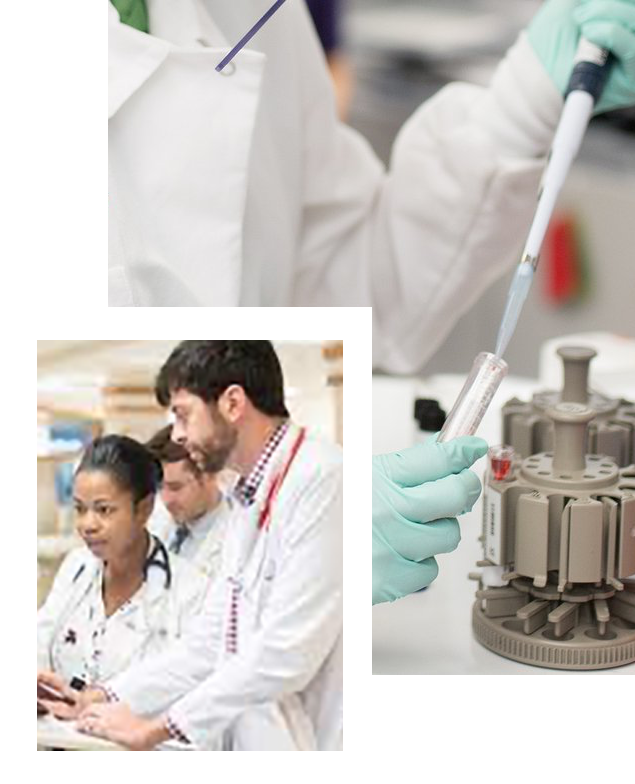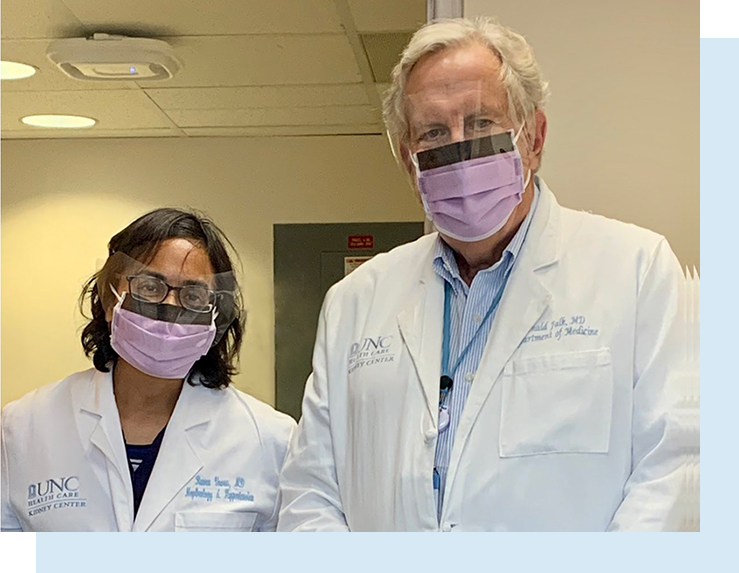Research

Research takes place in 11 affiliated centers, where world-class investigators often form enterprise partnerships. Here, scientific investigation demonstrates excellence from bench to bedside, in teams and interdisciplinary work, across the Department, School of Medicine and the University.
The UNC Department of Medicine is ranked #19 in NIH funding, in the top five public universities, with investigators receiving $109 million annually. Meanwhile, the UNC School of Medicine is ranked #5 for NIH funding of public medical schools. Our award funding supports disease-oriented research in fields such as cancer immunogenetics, malaria, diabetes, sickle cell anemia and clotting disorders. Research in the Department is led by investigators from undergraduate, graduate and post-doctoral students (MD and PhD), as well as our basic and clinical faculty.
US News Global University Rankings, including:
Endocrinology and metabolism
Infectious Diseases
Gastroenterology & Hepatology
Clinical Medicine
Oncology
Basic
Basic research in the Department takes place within and across our divisions. It also takes place across the University in collaboration with other schools, like the Eshelman School of Pharmacy and the Gillings School of Public Health. Department investigators collaborate with University researchers across a multitude of departments like Cell and Molecular Physiology and Genetics, and large multidisciplinary Centers such as the Marsico Lung Institute and the Institute for Global Health and Infectious Diseases. The Department also offers the Physician-Scientist Training Program, which recruits and trains young physicians who intend to pursue academic careers devoted to medical research.
Translational and Clinical
Translational research, focused on bringing scientific advances to bear on solving clinical challenges, is part of every division in the Department of Medicine. Investigations involve faculty throughout UNC’s Chapel Hill campus, but also with affiliated medical centers across UNC Health.
The new outpatient center at UNC Health Eastowne has an entire floor designed for patient intake and clinical studies, providing the ability to perform complex drug delivery studies on site. Besides serving investigators working on funded clinical trials, the Clinical Investigation Unit supports patient investigation on many levels.The North Carolina Translational and Clinical Sciences Institute (NC TraCS) is a key resource that supports, funds and trains our faculty and students in translational research. A directory of ongoing clinical trials and research studies across the Department of Medicine is available at Research for Me@UNC.

Disparities Research
The UNC Department of Medicine unequivocally affirms our mission to improve the health and wellbeing of North Carolinians and others whom we serve. Disparities in health outcomes disproportionately impact groups of people who have systematically experienced greater social and/or economic obstacles to health based on their racial or ethnic group; religion; socioeconomic status; gender; age; mental health; cognitive, sensory, or physical disability; sexual orientation; geographic location; or other characteristics historically linked to discrimination or exclusion. Committed to achieving health equity, our department comprises a strong contingency of faculty engaged in research addressing health disparities.
Scientific Training
- K-Grant Working Group
- R-Grant Working Group: (Basic, Population Health)
- Physician Scientist Training Pathway

PhD Community
The Department’s PhD faculty and other non-clinical faculty in our 12 divisions contribute to research, education and leadership that is central to our ongoing academic success. The Department’s non-clinical faculty have created important bridges between our divisions, promoting mutual support in an environment that nurtures innovation through collaboration. The Department’s PhD and non-clinical community comprises 50+ members.
Subspecialty Research
A range of basic, translational, and clinical research is performed across
the Department of Medicine’s many divisions and centers.